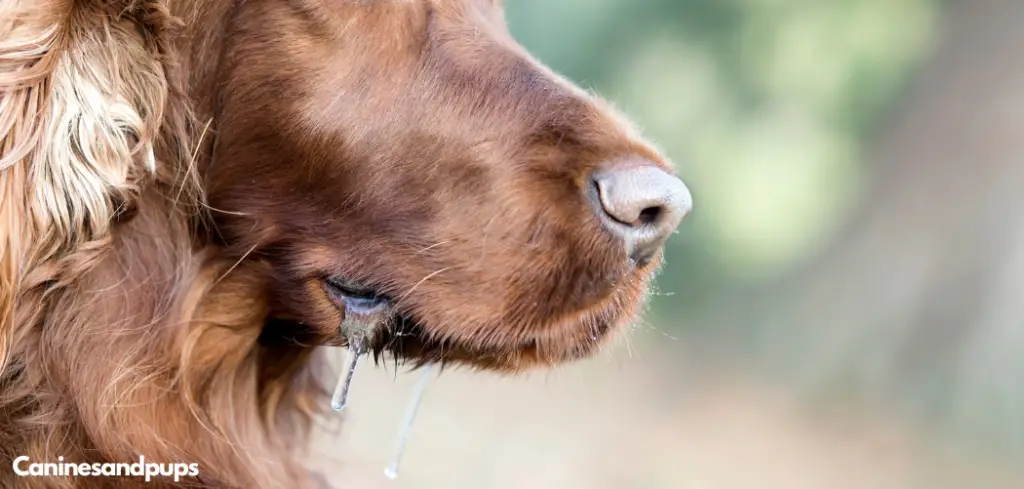When a dog starts drooling more than usual and refuses food, it can be a sign of an underlying medical issue. Excessive salivation paired with loss of appetite often points to pain, discomfort, or illness that shouldn’t be ignored.
We outline the common causes of a dog salivating and not eating, what you can do at home, and when to seek veterinary help.
Dog Salivating and Not Eating — Why It Happens
A dog that is salivating and not eating may be experiencing oral pain, nausea, toxin ingestion, or an underlying systemic illness. Dental disease, gastrointestinal upset, heatstroke, or even neurological issues can all lead to these symptoms.
In some cases, it may be a temporary response to a mild illness, but persistent or worsening signs should always prompt a vet visit.

Common Causes of Dog Salivating and Not Eating
Dental Problems
Dental issues like tooth abscesses, gingivitis, or broken teeth can cause significant mouth pain, leading to excessive drooling and refusal to eat.
The discomfort makes chewing difficult, and saliva may build up due to reduced swallowing.
Owners might notice bad breath, pawing at the mouth, or visible swelling on the face. In severe cases, a dog may completely avoid eating solid food.
Dental infections can spread to other organs, so prompt treatment is essential.
Read more: Dog Diarrhea and Not Eating (Causes and when to worry)
Nausea or Gastrointestinal Upset
Nausea often triggers both hypersalivation and appetite loss. Conditions like gastritis, pancreatitis, or motion sickness can make a dog feel sick enough to avoid food altogether.
You may notice lip-smacking, grass-eating, or frequent swallowing along with the drooling. Vomiting may or may not be present.
Gastrointestinal issues can worsen quickly, so it’s best not to delay care.
Exposure to Toxins or Irritants
Ingesting something toxic — like certain plants, household cleaners, or human medications — can irritate the mouth, throat, or stomach, causing drooling and a lack of appetite.
Other signs might include vomiting, tremors, or weakness. Even licking or chewing on a toxic substance can cause excessive salivation.
If you suspect poisoning, immediate veterinary attention is critical.
Oral Foreign Object
Something stuck in your dog’s mouth or throat, such as a bone shard or stick fragment, can lead to drooling and refusal to eat. The dog may act agitated, paw at their face, or repeatedly try to swallow.
This can become a choking risk or cause internal injury, so a vet should evaluate it urgently.
Heatstroke
Overheating can cause panting, drooling, and disinterest in food. If your dog has been exposed to hot weather or intense activity, and you notice these signs, take it seriously.
Look for signs like red gums, rapid breathing, weakness, or vomiting.
Heatstroke is a medical emergency that needs immediate cooling and veterinary care.
Neurological Conditions
Some neurological issues, such as seizures or facial nerve paralysis, can lead to drooling and eating difficulties. If the dog’s motor control is affected, they may not be able to chew or swallow effectively.
Other signs might include stumbling, abnormal eye movements, or personality changes.
These issues require thorough diagnostic evaluation and treatment by a vet.
What to Do If Your Dog Is Salivating and Not Eating
First, keep your dog in a calm and cool environment. Offer fresh water and avoid forcing food. Check for any visible injury, foreign objects, or swelling in the mouth, but only if it can be done safely.
You can try offering bland foods like plain boiled chicken and rice if your dog usually tolerates them well. Avoid treats or human foods, especially if vomiting is also present.
Observe your dog’s behavior closely. If symptoms improve within 24 hours and the dog resumes eating normally, it may have been a minor upset. However, any continued drooling or appetite loss warrants professional care.
Avoid home remedies for dental or toxin-related problems unless advised by your veterinarian.
When to Call or Visit Your Vet
Call your vet immediately if:
Drooling is profuse and continuous
Your dog hasn’t eaten for more than 24 hours
There is vomiting, lethargy, or diarrhea
You notice signs of oral pain or swelling
The dog appears dehydrated or weak
A toxic substance may have been ingested
Veterinary evaluation is especially critical for puppies, senior dogs, or dogs with existing medical conditions.
Read more: Dog Licking Lips and Not Eating (Is it pain or anxiety?)
Key Takeaway
When a dog is salivating excessively and not eating, it could indicate anything from dental pain to a serious medical condition. Don’t ignore these signs. While some causes are mild and resolve quickly, others require immediate veterinary attention. Keep your dog comfortable, monitor closely, and seek help if symptoms persist or worsen. Acting early can make all the difference in your dog’s recovery.
